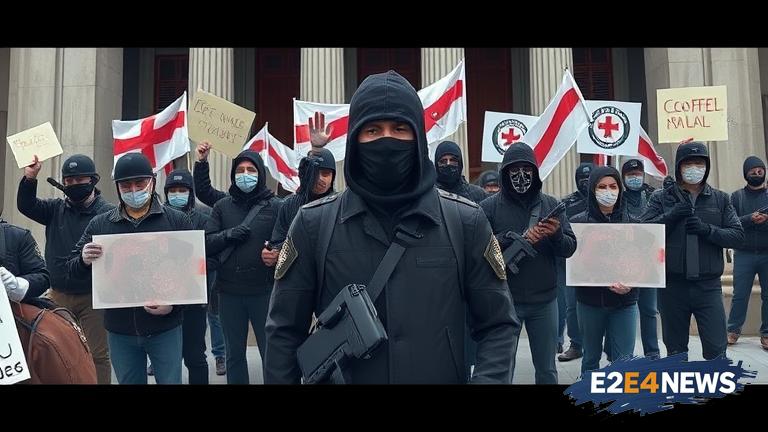In a move that has sparked widespread concern among human rights groups and opposition parties, the Georgian government has launched a trial against 11 protesters who were arrested during anti-government demonstrations in the capital city of Tbilisi. The protesters, who were detained in June, are facing charges of organizing and participating in group violence, which carries a maximum sentence of 6 years in prison. The trial, which began on September 1, is being closely watched by local and international observers, who are concerned about the fairness and transparency of the proceedings. The protesters were arrested during a wave of demonstrations that swept the country in June, with thousands of people taking to the streets to demand the resignation of the government and the holding of early elections. The protests were sparked by a range of issues, including corruption, economic stagnation, and the perceived authoritarianism of the ruling Georgian Dream party. The government has been accused of using excessive force to suppress the protests, with reports of police brutality and arbitrary arrests. The 11 protesters on trial are among dozens of people who were detained during the demonstrations, and their case is seen as a test of the government’s commitment to human rights and the rule of law. The prosecution has presented evidence that the protesters were involved in violent clashes with police, but the defense argues that the charges are politically motivated and that the protesters were simply exercising their right to free speech and assembly. The trial is being held in a Tbilisi court, with a panel of judges presiding over the proceedings. The prosecution is seeking the maximum sentence for the protesters, which would be a significant escalation of the government’s crackdown on dissent. The opposition parties and human rights groups have condemned the trial as a sham, and have called for the protesters to be released and the charges to be dropped. The European Union and other international organizations have also expressed concern about the trial, and have urged the Georgian government to respect the rights of protesters and to ensure that the proceedings are fair and transparent. The trial is expected to last for several weeks, with a verdict likely to be delivered in the coming months. The outcome of the trial will be closely watched, and could have significant implications for the future of democracy and human rights in Georgia. The country has a long history of political unrest and repression, and the current government has been accused of rolling back democratic reforms and consolidating power. The protesters on trial are seen as symbols of resistance against the government’s authoritarian tendencies, and their fate will be closely watched by opposition parties and human rights groups. The government has defended the trial as a necessary measure to maintain public order and to prevent violence, but critics argue that it is a thinly veiled attempt to silence dissent and intimidate opponents. The trial has also sparked a wider debate about the state of democracy and human rights in Georgia, with many calling for greater protections for free speech and assembly. The government has been accused of using the justice system to target opponents and to suppress dissent, and the trial is seen as a key test of its commitment to the rule of law. The opposition parties have vowed to continue their protests and to demand greater accountability from the government, and the trial is likely to be a major rallying point for their campaign. The international community is also watching the trial closely, and has urged the Georgian government to respect the rights of protesters and to ensure that the proceedings are fair and transparent. The trial is a significant challenge to the government’s authority, and the outcome will have major implications for the future of democracy and human rights in Georgia.
